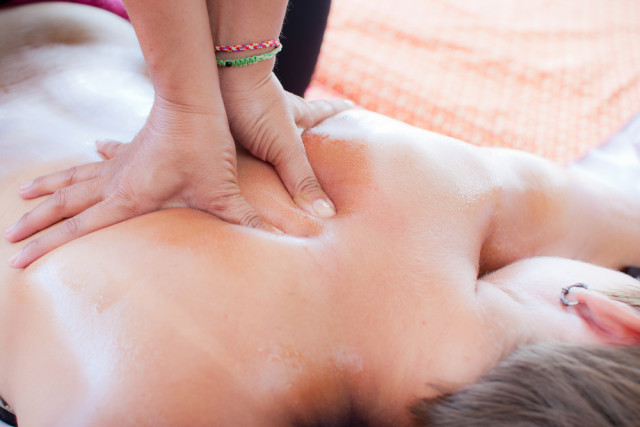How Much Pressure is Too Much Pressure in a Massage?

Image: jcsmilly
That awkward moment on the massage table—your therapist is digging into your shoulder...and it's kind of unbearable. Do you speak up? Do you suck it up to work out the knot? Local massage pro and wellness coach Erica Blair, BSC, CHHC, LMT weighs in on the etiquette of discomfort—and waves a banner for the purely relaxing massage.
Discomfort is not always necessary to loosen up muscles: "While there can be some pain when an area of the body is worked on, most sore muscles come from injury, overuse, underuse, and lack of oxygen or blood flow to that particular area—so often minimal pressure is used to help soothe the pain, no tears required."
There is a difference between good pain and bad pain: Bad pain during a massage doesn't ease up or make you feel better, while "'good pain' can happen when a sore muscle is worked on and it is a little bit uncomfortable but there is immediate relief. Many clients say, 'it hurts so good'. I like to call that pain formation therapeutic pain. On the other hand, going too deep during a deep tissue massage can add additional pain and cause nerve damage."
People want to get the full value of their massage, but overdoing it with pressure might be counterproductive: "Many think that their massage therapist needs to push them almost through the table to be affective, but not so. With techniques like Neuromuscular Therapy, it’s about precision and really knowing the anatomy inside and out. It’s about finding that sore spot and using pressure that meets each client's needs. Each of us has our own pain level threshold, there isn’t a one depth of pressure fits all. Using too deep of pressure during a massage can actually cause more trauma to the already irritated tissue and can cause bruising."
How to communicate to make sure the discomfort isn't too great: "A good therapist will always start a treatment with letting you know how to notify her if she is applying too much pressure—or not enough. If no tips are offered, feel free to speak up! You're not letting anyone down. It's also super important to fill out your health intake form in detail! Your massage therapist needs to know all of your health history so they can fit your treatment around any existing issues you make be experiencing."
There are plenty of physical health benefits to a massage that is relaxing and just plain feels good: According to Blair, a 1-hour relaxing massage:
- Reduces stress levels
- Moves blood and lymph throughout the body and helps with circulation
- Boosts the immune system
- Has been known to help lower blood pressure
- Has been know to help with those with depression
- Helps boost body image
- Helps digestion
- Helps sleep patterns
- Hastens healing in the body when an injury has occurred
- Helps alleviate sore muscle pain
